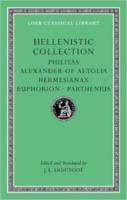
Harvard (Loeb Library, 2009) 662pp £16.95 (ISBN 9780674996366)
Excellent recent commentaries on authors of the Alexandrian period by Harder, Hollis and Stephens (Callimachus, Aitia, Hecale, Hymns), Hornblower (Lykophron), and Hunter (Apollonius Rhodius, Theocritus) have greatly enhanced our knowledge of the literature of the period; it therefore seems appropriate at least belatedly to acknowledge this admirable work by L. on the sadly few fragments of Philitas of Cos, poet and scholar, that have come down to us, and who is the main subject of this brief notice.
We know that he was tutor of Zenodotus and of the son of Ptolemy 1, which puts him in the later 4th and early 3rd centuries BC; that he was evaluated by Callimachus and praised by his pupil Theocritus; that he mainly composed in elegiacs; that he was well-known as a scholar; that he certainly influenced Ovid and Propertius; that Quintilian bracketed him with Callimachus, and that Statius brackets him with Callimachus, Propertius, and Ovid. Yet there is no surviving fragment longer than four lines, and papyri have helped hardly at all. His elegiac poem Demeter—Cos had a cult of her—has left no certain trace; whether he played any part in the development of bucolic poetry (as is possibly implied in the 7th Idyll of Theocritus) is equally speculative. It is a melancholy thought that the fragments show us more of the grammarian than the poet. He is the ghost at the Alexandrian feast.
L. follows a general Introduction and bibliography (pp. vii-xix), with a brief individual Introduction to Philitas, and then has mainly testimonia to deal with, some 44 all told. One of them, by Callimachus, is of tantalising interest: in P.Oxy.2079 we seem to read either that the short poems of Philitas and (the much earlier) Mimnermus are being compared favourably with their long ones, or that short poems are being favourably compared with the long poems of a different author, possibly Antimachus. L. did not have the advantage of having Harder’s Aitia available, where the evidence is subjected to detailed and acute analysis. Against the majority opinion, Harder favours the second option (which indeed accords with Callimachus’s general approach). A few lines quoted in Stobaeus suggest that the poet saw himself as refined, learned and dedicated; but from the other pitiable remnants hardly anything can be gleaned. Yet we know from an epigram of Posidippus, found in the Milan papyrus, that Ptolemy II (Philadelphus) commissioned a statue of him in bronze by Hecataeus, no mean memorial.
Of the other authors collected here, for whom a few words must suffice, all are dealt with in an equally thorough fashion (Introduction, testimonia, fragments), but only Hermesianax can offer any extended passage of poetry (90 odd lines of elegiacs from Leontion, quoted by Athenaeus: would that he had done the same for Philitas). Parthenius, previously lodged in an old Loeb volume with Longus, now appears in an editio altera auctior correctior. Euphorion, a poet of the ‘Avant-garde’, we remember from Cicero’s disparaging comment in the Tusculan Disputations, ‘cantores Euphorionis’. Macrobius regarded Alexander of Aetolia as an ‘excellent poet’, a judgment which the available fragments do not enable us to confirm or dispute.
A most useful addition to the Loeb Library, on which L. is to be congratulated.
Colin Leach
